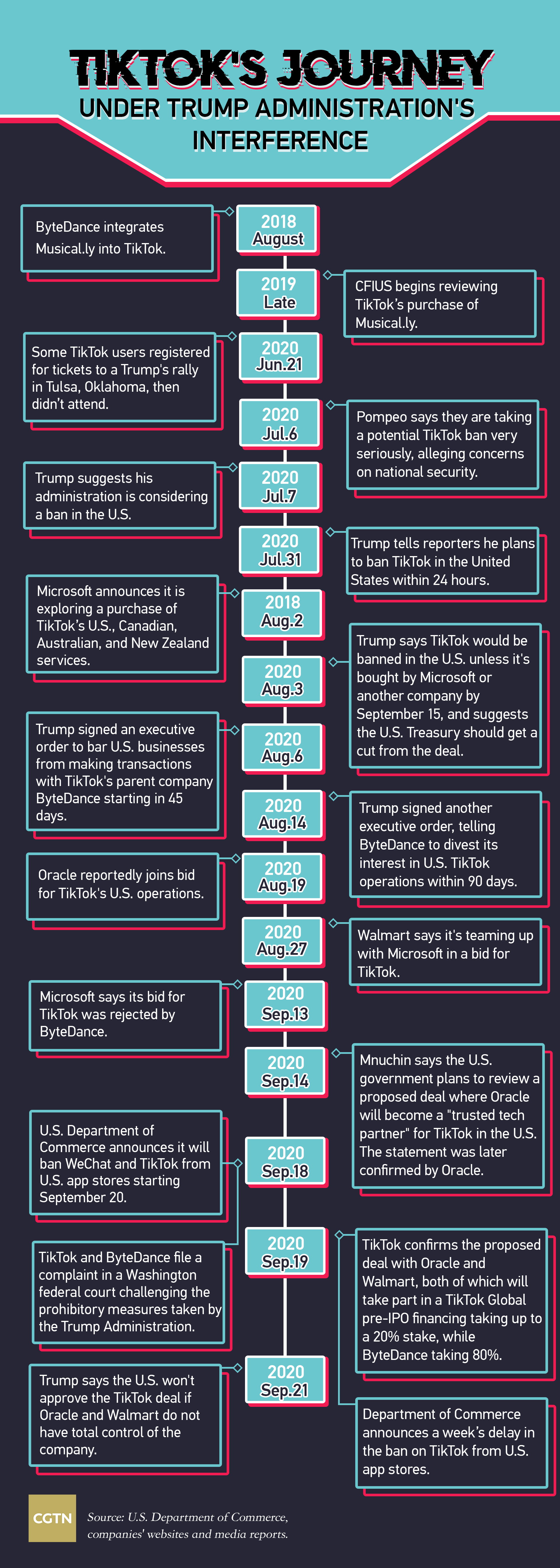Short-video sharing platform TikTok has drawn wide attention since the Trump Administration attacks started, a fact that has been weighing on the company's U.S. operations.
TikTok allows users worldwide to create short videos powered by music. Launched in 2017, the app popularity surged due to the COVID-19 confinements. But its growing popularity has somehow dragged it to the crosshairs of escalating tensions between China and the U.S.
In July, the Trump Administration officially signaled a potential ban on the company in the U.S., alleging concerns over national security because of the company's Chinese ties.

Indeed, the U.S. scrutiny on TikTok started even before that. In late 2019, based on concerns on national security, the Committee on Foreign Investment in the United States (CFIUS) investigated TikTok's acquisition of Musical.ly, which closed in 2018. Although no public comments were made on the review, the CFIUS' decision echoed with President Donald Trump's politicized takeover move towards the company.
To further curtail TikTok, Trump also signed two executive orders to block the U.S. companies' transactions with ByteDance Ltd. - TikTok's parent company in Beijing - and to takeover TikTok's U.S. operations.
The troublesome fate of the company seems to see no end in sight yet, despite the fact that there is a deal being negotiated between ByteDance, Oracle Inc. and Walmart.
Under the deal, Oracle and Walmart will become TikTok's "trusted technology providers," responsible for U.S. users data security, a measure taken to address the security concerns of the U.S. government.
Additionally, both the U.S. partners will take part in a TikTok Global pre-IPO financing, after which they can take up to a 20-percent stake, while ByteDance owns 80 percent.
Trump on Monday said the U.S. won't approve the TikTok deal if Oracle and Walmart do not have total control of the company, just a day after he said he "approved the deal in concept."
Read more:
ByteDance not to sell TikTok's U.S. operations to Microsoft or Oracle: Sources
"TikTok's U.S. drama sends a signal that the ways of doing business in the U.S. are moving from rule of law, where the law is applied objectively, to rule by law where the law is just a tool for the government to achieve whatever goal it wants," said Andy Mok, commentator and research fellow at Center for China and Globalization.

Despite the U.S. government scrutiny, TikTok was the most downloaded non-gaming app worldwide in August, with more than 63.3 million installations worldwide, according to SensorTower.
But the future of the app is full of uncertainties, as the U.S. Department of Commerce last Friday issued an order banning U.S. transactions with TikTok and messaging app WeChat starting September 20, from which any provision of service to distribute or maintain the WeChat or TikTok mobile applications, constituent code, or application updates through an online mobile application store in the U.S. will be prohibited.
Read more: Understanding Trump's TikTok and WeChat ban
The U.S. government's previous executive order was issued without due process, said TikTok after it learnt about the order, adding that "it may deprive the American people and small businesses of an important platform for their voice and living." On the same day, TikTok and ByteDance have filed a compliant in Washington federal court challenging the recent prohibitory measures by the Trump Administration.
Read more:
TikTok slams U.S. action, says will continue to advance proceedings against Trump's executive order
The Department of Commerce, on September 20, announced an order to delay TikTok's U.S. app store ban, saying that the decision was taken "in light of recent positive developments," and at Trump's direction the ban will be postponed until 11:59 p.m. September 27.
(Graphics by Du Chenxin and Li Jingjie)